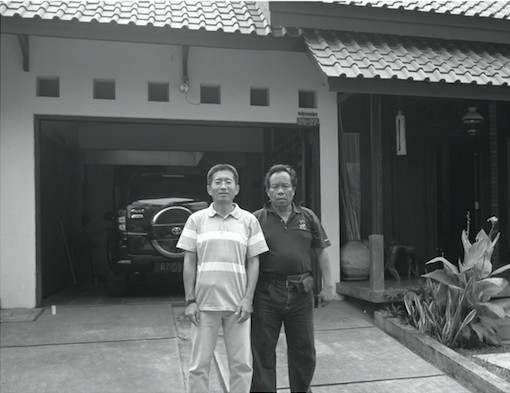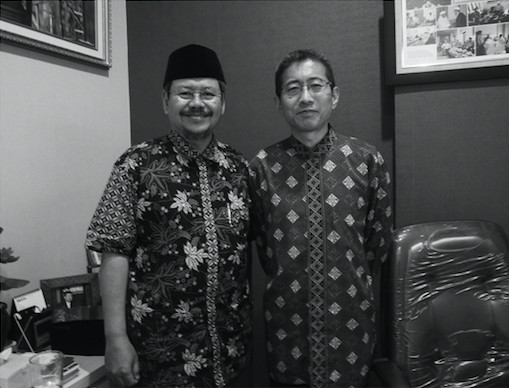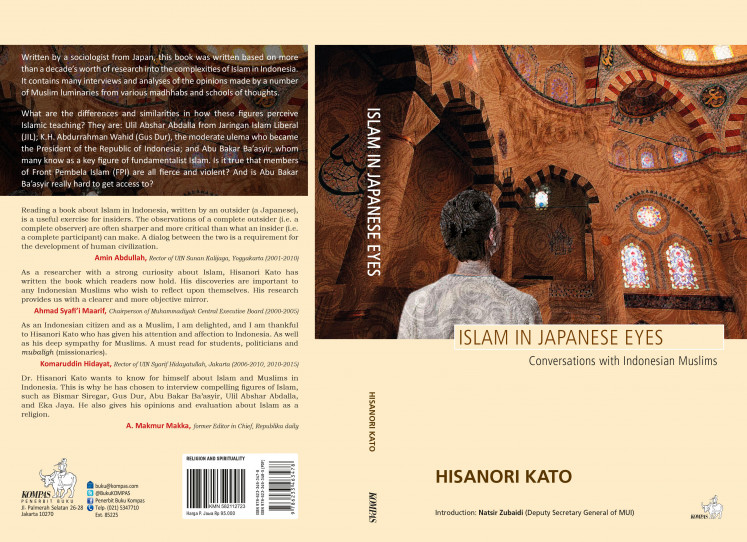Popular Reads
Top Results
Can't find what you're looking for?
View all search resultsPopular Reads
Top Results
Can't find what you're looking for?
View all search resultsIn his eyes: Japanese scholar chronicles firsthand accounts of Muslim figures
Change text size
Gift Premium Articles
to Anyone
 Personal snapshot: Hisanori Kato (left), a policy studies professor at Chuo University, Tokyo, poses with cultural expert and author Mohamad Sobary, in an image extracted from Kato’s Islam in Japanese Eyes: Conversations with Indonesian Muslims. (Courtesy of Penerbit Buku Kompas) (Courtesy of Penerbit Buku Kompas/Courtesy of Penerbit Buku Kompas)
Personal snapshot: Hisanori Kato (left), a policy studies professor at Chuo University, Tokyo, poses with cultural expert and author Mohamad Sobary, in an image extracted from Kato’s Islam in Japanese Eyes: Conversations with Indonesian Muslims. (Courtesy of Penerbit Buku Kompas) (Courtesy of Penerbit Buku Kompas/Courtesy of Penerbit Buku Kompas)
J
apanese political scientist Hisanori Kato’s poignant firsthand account of his encounters with Indonesian Muslims from 1991 to the first decade of this millennium provides invaluable insights into a stormy period in Indonesian history.
Indonesia’s cultural idiosyncrasies and contrasts are forever ingrained in Japanese scholar Hisanori Kato’ psyche, years after he experienced them firsthand living intermittently in the country from 1991 to 2009.
More specifically, the policy studies professor at Tokyo’s Chuo University recounts his observations of Islam’s important role in Indonesia in Islam Di Mata Orang Jepang: Ulil, Gus Dur, Sampai Baasyir (Penerbit Buku Kompas, 2014), now available in English as Islam in Japanese Eyes: Conversations with Indonesian Muslims, also by Penerbit Buku Kompas (Kompas book publishing).
The book also covers the turbulent period following the fall of president Suharto’s New Order regime in 1998, which was marked by an increasingly assertive stance among fundamentalist and moderate Muslims, as well as bitter conflict between Islamic militants and Indonesian authorities.
This period saw multiple acts of terror, including the 2002 Bali bombings that killed over 200 people and injured hundreds more, including foreign nationals, the relatively smaller attacks in Jakarta on the Australian Embassy in 2004 and the Marriott Hotel in 2003 and 2009. It also saw a surge in vigilantism by the Islamic Defenders Front (FPI) in the capital and other cities.
Yet, Kato seems to have taken the chaos around him in stride, his prose capturing the conversational, calm tone he uses with his subjects. Nonetheless, this approach belies his high awareness of the tensions of the time and the diverse forms of Islam in Indonesia, as well as his efforts to understand Islam’s place in the national psyche.
Kato also seeks to find the humanity behind the forbidding facade and rhetoric of fundamentalist Islam, which he tries to distinguish from terrorism through a sensitive, impartial manner. This is reflected in the chapters’ personalized approach, each designed to give his sources their say, including FPI militant Eka Jaya and firebrand cleric Abu Bakar Baasyir, both terror convicts
Despite his friendly approach to Eka, who was imprisoned for his 2005 attack on a Jakarta nightclub, it is clear he has no illusions about Eka’s crime. But it is also because of his approach that Kato was able to glean how poverty, marginalization and Islam influenced Eka’s actions and shaped his identity as a Betawi (native Jakartan).
Amiable meeting: Hisanori Kato (right), author of Islam in Japanese Eyes: Conversations with Indonesian Muslims, appears with former Hizbut Tahrir Indonesia (HTI) head Ismail Yusanto in an illustrated page from his book. (Courtesy of Penerbit Buku Kompas) (Courtesy of Penerbit Buku Kompas/Courtesy of Penerbit Buku Kompas)Still, Kato’s account of the terror convict strikes a nerve, years after President Joko "Jokowi" Widodo’s government disbanded the FPI in December 2020.
Neither did Kato let controversy get in his way as he reached out to Baasyir, whom he describes as a "stubborn uncompromising old man ... [who] is the type of father that would impose a curfew on his daughter". On the other hand, he also shows that the cleric, who served 15 years in prison for terrorism charges, among them complicity with Jemaah Islamiyah, the prime suspects behind the 2002 Bali bombings that pledged allegiance to Islamic State (ISIS), was an accommodating host. Though Kato has no qualms about referring to Baasyir as “uncompromising” and “unbending” in his take on Islamic principles, he still retains a respectful stance principle.
Meanwhile, his encounter with Ismail Yusanto, the former head of Hizbut Tahrir Indonesia (HTI), is more low-key as Kato contrasts Ismail’s fundamentalist interpretation of Islam, epitomized by his premise that "a degenerate society is caused by the lack of a caliph and the failure to apply syaria”, with Indonesia’s more secular Pancasila state ideology that prompted the government to ban HTI in June 2017.
On the more secular end of the spectrum, Kato reveals that moderate Ulil Abshar Abdalla is opposed to Islam in politics, while feminist Lily Munir characterizes Islam as a religion "that treats humanity impartially, both men and women" and criticizes fundamentalist Muslim groups as wanting “to control women".
Kato also shows that, for his part, politician Fadli Zon actively espouses Islam in politics. This is reflected in Fadli’s strident criticism of President Jokowi as a member of the opposition Gerindra Party, years after his interview with Kato.
The highlight of Islam in Japanese Eyes is Kato’s recollections of the late former president Abdurrahman “Gus Dur” Wahid, which show that Wahid’s moderate outlook hinged on his view of religion as a matter of individual conscience, not of the state. This segment also poignantly describes what turns out to be Wahid’s last meeting with Kato, shortly before the Nahdlatul Utama cleric passed away in December 2009.
More than anything, Islam in Japanese Eyes shows Kato’s awareness of Islam, which continues to be misunderstood and viewed negatively in Japan, particularly after 9/11. It also reflects the academic’s unflinching, yet sensitive approach to religious issues, which won him the Toynbee Talbutt Award for comparative cultural studies.
Islam in Japanese Eyes is also the culmination of Kato’s other works on religion and society, such as Agama Dan Peradaban (Religion and civilization, Dian Rakyat, 2002), Verity or Illusion?: Interfaith Dialogues Between Christian and Muslims in the Philippines (CENAS, 2008) and The Clash of Ijtihad: Fundamentalist versus Liberal Muslims (ISPCK, 2016).
Kato’s dispassionate, outsider’s view of Islam in Indonesia is sharp and clear, and he balances this with his deft, tactful and guileless prose. While much has changed over the years for Kato’s interview subjects, Islam in Japanese Eyes is still an invaluable addition to the bookshelves of anyone interested in getting up close and personal with Islam in early 21st century Indonesia.
Islam in Japanese Eyes: Conversations with Indonesian Muslims
Penerbit Buku Kompas, 2022, English, 176 pages












